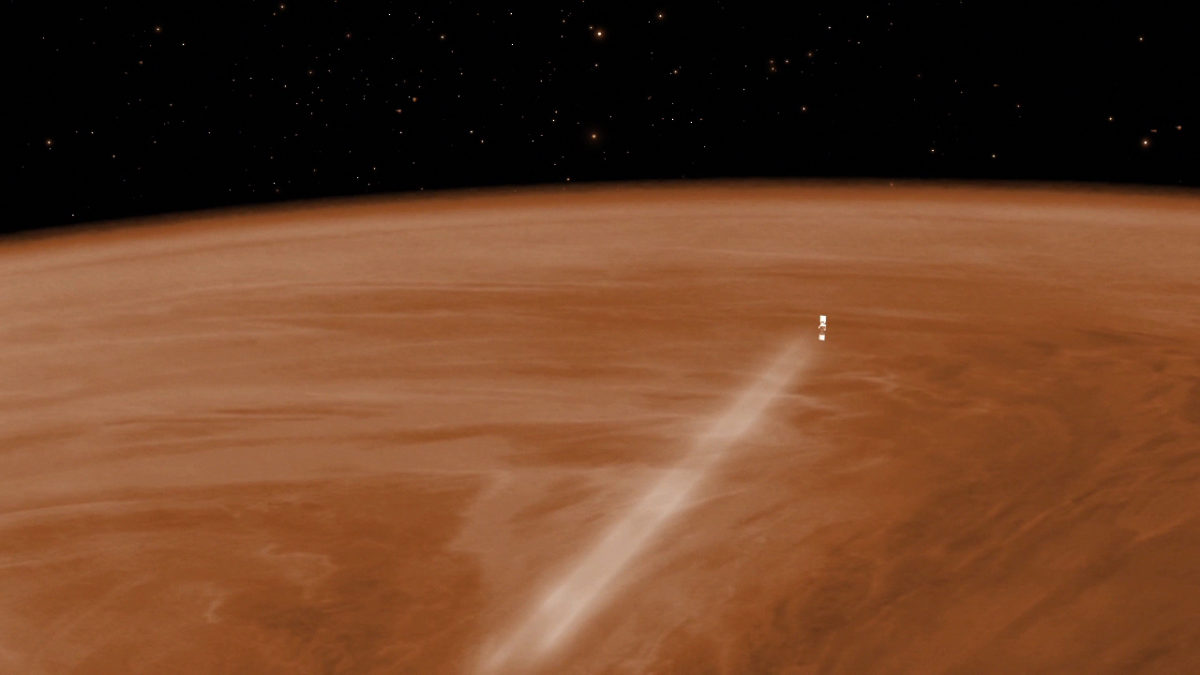Emily Lakdawalla • Dec 11, 2014
Brief Venus Express update: Not quite dead yet
Venus Express is almost out of fuel. A few days ago, it looked like it might be completely out of fuel, according to a status update shared by ESA:
On 28 November 2014, the flight control team at ESOC reported lack of contact with Venus Express at the first opportunity for communication with a ground station after execution of the 6th of the pericentre-raising manoeuvres.
It is possible that the remaining propellant onboard VEX was exhausted during the manoeuvre (see blog post here).
Repeated attempts to re-establish contact using ESA and NASA deep-space tracking stations have been made since then, and there has been some limited success in the period since 3 December.
Although a stable telemetry link is not available, some telemetry packets were successfully downlinked. These confirm that the spacecraft is currently in survival mode pointing the solar arrays to the Sun; the spacecraft is in a ‘2-axes stabilised’ mode, meaning that it is rotating around the axis of the line connecting VEX to the Sun (the ‘Sun line’).
The operations team is currently attempting to downlink the table of critical events that is stored in protected memory on board, which may give details of the sequence of events which occurred over the past few days. The root cause of the anomaly (propellant situation or otherwise) remains to be established and investigations are on-going.
We will provide an update as soon as something more concrete is known.
Since then, I have heard through the grapevine that there have been more communications sessions with Venus Express, of unknown quality. A talking spacecraft is a million times better than a silent spacecraft, because it means many things: it's stable; it's functional; it is power-positive; it knows when and where it is; it knows how to talk to Earth. So that's excellent news. But time may be running out. I sent an email to project scientist Håkan Svedhem today to find out more, and here is what he replied:
At this time we are quite convinced that the cause of the communication problems we have is that we are near, or at the point of being out of fuel. Estimating fuel to a high precision on spacecraft is an inherently difficult task. We knew it would come, we just could not tell exactly when. The spacecraft is pointing with its solar panels safely to the Sun so power is no problem. We are still trying to get the spacecraft pointing with the main antenna towards the Earth so that we can get a reliable link but there may not be much more to conclude than that we are out of fuel. At the moment we do get some data but at a very limited rate and in an unpredictable way. In a few days we should know a bit more. In any case the orbit is such that if nothing spectacular will happen the spacecraft will enter into the atmosphere of Venus sometime in mid January. The mission was originally foreseen for 500 days but has made more than 8.5 years and has provided more data than all previous missions to Venus added together, so we are more than happy with the outcome whatever happens now.
So it looks very likely that we will lose Venus Express in January. As Håkan said, we should all be proud of Venus Express, and happy with what it has accomplished. Yet I'll still be sad to lose our only active Venus spacecraft -- and just two months before we will watch our only active Mercury spacecraft make its final, too-low orbit around the innermost planet. We need another Venus mission.
On each orbit, Venus Express feels a little more of a headwind, a little more pressure, a little more heating. Each one will be a little harder to survive. As you celebrate the holidays and the new year, spare a thought for a spacecraft that has served long and well, making its last few passes around Venus, trying to talk to us the whole time about the forces it feels.

The Time is Now.
As a Planetary Defender, you’re part of our mission to decrease the risk of Earth being hit by an asteroid or comet.
Donate Today

 Explore Worlds
Explore Worlds Find Life
Find Life Defend Earth
Defend Earth

